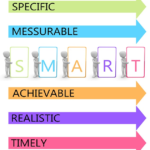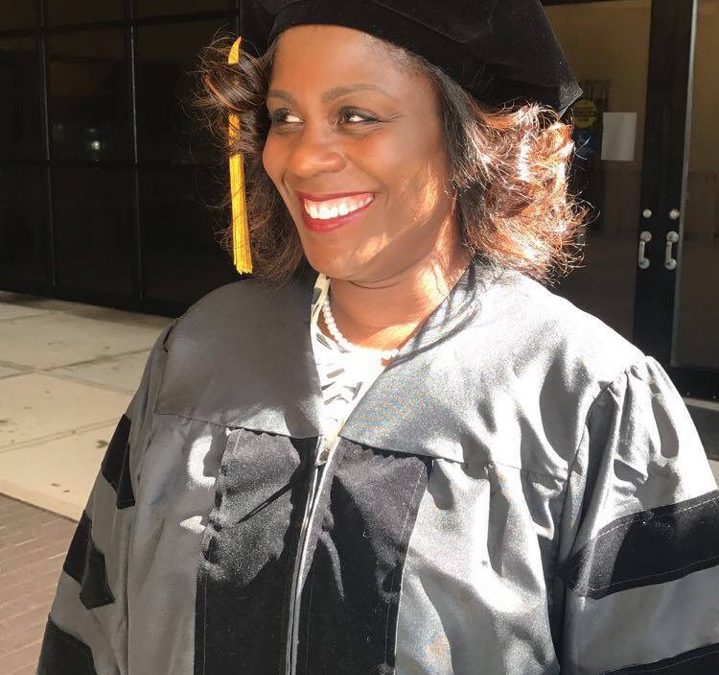
by Marcia Davis-Dawkins | Jan 30, 2018 | Education, Kids, Parents, Teachers, Teens
Accept You For Who You Are

By Marcia Davis-Dawkins
How many times have we heard the expression, “Follow your dreams”? At times it just seems so overused and meaningless. In this 21st century, we are always competing for several things, especially jobs. Life simply feels stressful because of the pressures we face. At times it feels as if self-talk has to come into play to dig us out of life’s ditches. Self-talk can help us to have better self-confidence. One of the things that we should invest in is a gratitude journal where we can write down what we are thankful for and appreciate what we sometimes take for granted. If we have a gratitude journal we can also begin our day with positive thoughts.
S.M.A.R.T

On a whole, we have to accept who we are and teach people to love us. We should love ourselves as well as set standards and morals for ourselves. We have to learn to appreciate who we are before we can appreciate and love other people including our students. We should dream big and set SMART goals. S.M.A.R.T. goal is defined as one that is specific, measurable, achievable, results-focused, and time bound. Own and Hone your craft – be passionate about what you do (your passion should be in line with your purpose). Evaluate your path and progress. Stay focused no matter what the issues or the problems. We should be the best that we can be and realize that success doesn’t come overnight but we should begin our journey without fears.
Accept Yourself
Psychotherapist, Margarita Tartakovsky lists 12 Ways to Accept Yourself:
- Set an intention.
- Celebrate your strengths.
- Consider the people around you.
- Create a support system.
- Forgive yourself.
- Shush your inner critic.
- Grieve the loss of unrealized dreams.
- Perform charitable acts.
- Realize that acceptance is not resignation
- Speak to your highest self
- Be kind to yourself
- Fake it til you make it

As educators, we can help students set goals and if and when they fall off course try to get them back on track. Keep encouraging them because there is something good within all of us. We should let the our mantra be, “If a task is once begun, never leave it till it’s done. Be the labor great or small. Do it well or not at all.”
Determination and Perseverance

by Marcia Davis-Dawkins | Jan 8, 2018 | Education, Kids, Parents, Teachers, Teens
I Can Do All Things
 By Dr. Marcia Davis-Dawkins
By Dr. Marcia Davis-Dawkins
Whenever a New Year begins people often reflect on the past year and set new goals that they want to accomplish. The intention may be to lose weight, eat healthy, begin college, or start a diet, among many others. Whatever it is, it usually calls for will power, self-talk, motivation or simply encouragement from friends or family. It takes some inner strength and dogged determination to achieve the goals which were set.
Motivational Speaker Jessica Cox
Take for instance, Motivational Speaker Jessica Cox. She has defied all odds by turning obstacles into accomplishments. Jessica Cox was born without arms as a result of a rare birth defect, but that has not stopped her from being a dancer, a swimmer, and driver of a car. Astonishingly , she drives a car without having to use her upper body. She uses her feet like most people use their hands, enabling her to drive an unmodified car with an unrestricted license. She can also type on a keyboard at twenty-five words per minute, pump her own gas, and to put in and remove her contact lenses. Additionally, she is a certified SCUBA diver. Jessica Cox also has her Sport Pilot Certificate for an ERCO 415-C Ercoupe, designed in the 1940s, which the Federal Aviation Administration has designated as a light sport aircraft. The plane that she flies was built without rudder pedals. Instead, the rudder interconnects with the ailerons through the yoke. This unique design allows Cox to control the airplane with one foot controlling the yoke, while the other foot controls the throttle.
After reading about Jessica Cox and her accomplishments, there is hardly anyone who can say that they wouldn’t be able to achieve whatever they conceive and believe. In a previous article, I discussed what it means to do self-talk . There is power and life in the tongue. Speak success into your life. Once there’s life, there’s hope. We should encourage each other with positive vibes. The sky is the limit and as educators we have to incite ourselves,as well as our students, to reach for the sky.
I Can
Jessica’s story has shown us adversities and challenges should not prevent us from trying and doing our best. Once we put our minds to accomplishing something, we can do it since we say “I Can” is in the phrase “I Can’t!” In the long run, challenges turn us into better people. How can an educator or a parent encourage a student or child to follow his or her dreams? We could help and introduce students to SMART goal setting, When we set goals they will be motivated, purpose will be improved and attention will be more focused. As educators we must give students positive feedback. Be a role model and use words that inspire and compliment. A single word can change a student’s life or dream. New year, new beginning ! We can redirect a student’s path to positively. Let us also walk in newness, strength and boldness! Remember as Napolean Hill once said, “Whatever the mind can conceive and believe it can achieve!” 
Determination and Perseverance

by Marcia Davis-Dawkins | Dec 19, 2017 | Education, Parents, Teachers, Teens
Education and Success
 By Dr. Marcia Davis-Dawkins
By Dr. Marcia Davis-Dawkins
“What are you studying again?” “Why are you still in school?” “You are still studying?” These are some of the questions I often hear from my peers or family members. I heard those questions so many times that I just wanted to take a few steps back and look at them under a microscope.
Professional Student 
I guess being hungry to learn, or what some people refer to as a “professional student,” is seen as a terrible thing. Some people, including myself, are often referred to as professional students, but are simply trying to study for several reasons. What are some of the reasons why people study or go further than high school education? The list seems endless, but includes some of the following: –
- To climb the ladder of success
- To be someone
- To use as an equal opportunity
- To gain knowledge
- To improve one’s knowledge
- To be more diverse
- To be more proficient in their aspirations in life
- To fulfill job requirements (to get promoted)
- It is fun to learn – some people just simply like to learn
- To gain employment
- To make more money
- Want to get a higher education than their parents did
- To set an example for their children
- To switch careers
- To make a connection (meet people) or to network
- To reinvent self
- Love to learn
- Gain independence
- Employment
- To break the glass ceiling
The reasons may vary but ideally, in the long run once you are educated no one can take education away.
As I reflect on myself as an educator, I wonder how students feel about being in my classroom. Do I encourage and promote a love for learning? I can engage students in continued learning so they enjoy and value learning
Changing the powerless with Education and Success!
Since I am given the curriculum, I should try to focus on the classroom environment, the materials that I use to engage the students, as well as their interests. The activities and materials that I use to teach students should not be boring or mundane. If I show enthusiasm about the subjects I teach, then students will be excited about learning and want to keep learning. I should explore the various learning styles to meet my students’ needs. Do I value their thinking? Do I think about their differences? Do I set specific learning goals for the students so they will love learning? I should always be thinking about how I can help my students feel a sense of belonging and also get to know their parents. I can implore upon them that education holds them up for the rest of their lives. It’s part of the foundation upon which everything else rests.
As a teacher, I can share information about the student’s specific areas of weaknesses and strength so I can help parents realize the underlying causes of their child’s difficulty. This conversation can also include information about how to help their child use areas of strength to support areas of weakness. This will promote success for the students. I can use my educational status to change the powerless.
It is vital to remember that in this fast paced world, staying in the same place is actually going backward. If you don’t keep learning, if you choose to stand still, you will fall behind in the game of life. It’s usually what you learn after you think you know it all that is the most valuable!

by Marcia Davis-Dawkins | Dec 4, 2017 | Education, Kids, Parents, Teachers, Teens
The Teacher Who Makes a Difference!!!
 By Dr. Marcia Davis-Dawkins
By Dr. Marcia Davis-Dawkins
Gail Goldwin once said, “Good teaching is one-fourth preparation and three-fourths theater.” It is not uncommon for teachers to spend many hours  grading papers, preparing lessons, entering grades in computers and just figuring out how to make a lesson fun and exciting to students. Those teachers who go above and beyond to help everyone they meet deserve hugs and the highest honors. To the teachers who have to wait for the custodians to open doors to the school every morning, this is for you. Because every time I feel like I’m early for work at 7 am, there are a few people who are already ahead of me, photocopying assignments for learning groups.
grading papers, preparing lessons, entering grades in computers and just figuring out how to make a lesson fun and exciting to students. Those teachers who go above and beyond to help everyone they meet deserve hugs and the highest honors. To the teachers who have to wait for the custodians to open doors to the school every morning, this is for you. Because every time I feel like I’m early for work at 7 am, there are a few people who are already ahead of me, photocopying assignments for learning groups.
Being Ready to Teach
By 8:35 am every morning those same teachers are ready to teach with creative, interesting, rigorous and thought-provoking lessons. Lessons that open the students’ minds, and not only encourage them to absorb facts, but acquire understanding.
Many years ago when I was hired to teach at an urban school district in New Jersey, it was hard to adjust to the new environment. But the same teachers who were up early in the morning to prepare, were the same ones who welcomed me, by having students write me letters of advice on how to become a wonderful teacher like the ones they already had. Since that day, it has been my quest to make my classes just as fun- filled and rigorous as their classes. It was William Ward who said, “The teacher explains, the superior teacher demonstrates, and the great teacher inspires.” The teachers who go above and beyond have motivated me and so many other faculty members to be the best teachers we can be by seamlessly weaving fun and custom wrapped methods which result in success for divergent personalities.
Having humility, patience and enthusiasm for the subject area is how inspirational teachers continue to do so well. They have high expectations for their students and the students enjoy the encouragement as they rise to the challenge. They provide a warm environment that allows their students to make mistakes.
On a professional level, these teachers are always willing to collaborate and make suggestions where needed. Great teachers do not say things like, “You’re really not cut out for this.” “This is not your thing.” They realize that students soon learn their own limitations and do not erect false ceilings up for them. Inspirational teachers have been consistently driving students to be the best that they can be for many years.
When a school is divested of such individuals, whether through attrition, retirement, reassignment, etc., everyone suffers. Sure, their positions may be filled, but they can rarely be replaced. There remains a resounding void, both in the classroom and in the hearts of those for whom their inspiration may have been his or her last hope. Teachers Who Makes a Difference
HOME
Get Notified About Our Blog Post Subscribe Below

by Marcia Davis-Dawkins | Nov 27, 2017 | Education, Teens


By Dr. Marcia Davis-Dawkins
I am certain that you have felt rejection in some form!
I have been down that road several times and it is never taken lightly. Rejection comes in many forms, some of which include:
- interview choice
- job choice
- award choice
- team choice
- home owner choice
Several questions/thoughts arise after being rebuffed. “Why didn’t I get that?” “Am I not good enough?” For the broken relationship, “What could I have done differently?” “Am I beautiful enough?” “Am I too fat?” Too skinny?” I, like most people, was often tormented with self-doubt. With the questions and thoughts, came the wallowing in self-pity. I was weak and my defenses were down. I didn’t feel like fighting, but then I started to search my heart and asked myself, “Is there a wicked way in me?”
I should despise my weaknesses, but then comes the self-talk – “Timing is always key – nothing happens before its time.” “Maybe I wasn’t ready to be an accountant; I was rejected for a reason.” I often use my defeat to see how I can help my students, and others who cross my path. I am learning to be thankful for even not being chosen. It’s part of my process to be stronger. I have to learn to love me, grow in my own skin and appreciate me for me.
How do I pass this on to my students who cross my path? Do I treat them according to their needs? Do I give one more attention than the other? Do they crave my attention and I pass them by or shrug them off? Do I put myself in their shoes? Do I minimize their worth? Do I show them respect? Are my students behaving badly because I show some preferential treatments? Do I dismiss their responses? How do I make my students feel? Do I allow them to have a voice? Do I connect with them so they feel comfortable in my classroom?
As educators and parents we have to consider some, if not all of these questions and see how we make others feel.
There is a quote by Maya Angelou that resonates with me . “People may not remember exactly what you did, or what you said, but they will always remember how you made them feel”. What would we want our children/students to remember after our encounter with them? We should treat others, including our children/students, the way we want to be treated!
I believe, however, that one of the biggest responsibilities I have is teaching students to re-visualize rejection. The harsh reality is that no one escapes it. Once one progresses past the “participation trophy” phase of life, rejection is a given. Those disappointments should be viewed not as failures, but as opportunities to redirect to something even better. While the immediate dismissal may cut like a laceration to the soul, in actuality, one learns more from rejection and failure than from acceptance and success.
Consider the example of Mr. Jack Ma, a Chinese business magnate, philosopher, philanthropist and founder and executive director of Alibaba, a conglomerate of internet businesses. He relates the story of how when KFC first came to China, he threw his hat into the ring as one of the job applicants. He stated that twenty- four people completed applications and twenty-three were accepted…all but him. Additionally, this was only one of the thirty jobs that he had applied for and was given the thumbs down. But he speaks of how he was motivated by that rejection, and while for some it might have been the end of a story, for him, it was the beginning. He learned that out of his greatest rejection came his greatest direction. He realized that life was tough, but so was he. He embraced the notion that successful people reject rejection. Today, Mr. Ma has a net worth of 47.8 billion dollars. On occasion, he orders at the KFC drive-through. He does not gloat, stick out his tongue nor pump his fist in victory, but rather always offers an overly enthusiastic “thank you!”
HOME










 grading papers, preparing lessons, entering grades in computers and just figuring out how to make a lesson fun and exciting to students. Those teachers who go above and beyond to help everyone they meet deserve hugs and the highest honors. To the teachers who have to wait for the custodians to open doors to the school every morning, this is for you. Because every time I feel like I’m early for work at 7 am, there are a few people who are already ahead of me, photocopying assignments for learning groups.
grading papers, preparing lessons, entering grades in computers and just figuring out how to make a lesson fun and exciting to students. Those teachers who go above and beyond to help everyone they meet deserve hugs and the highest honors. To the teachers who have to wait for the custodians to open doors to the school every morning, this is for you. Because every time I feel like I’m early for work at 7 am, there are a few people who are already ahead of me, photocopying assignments for learning groups.
